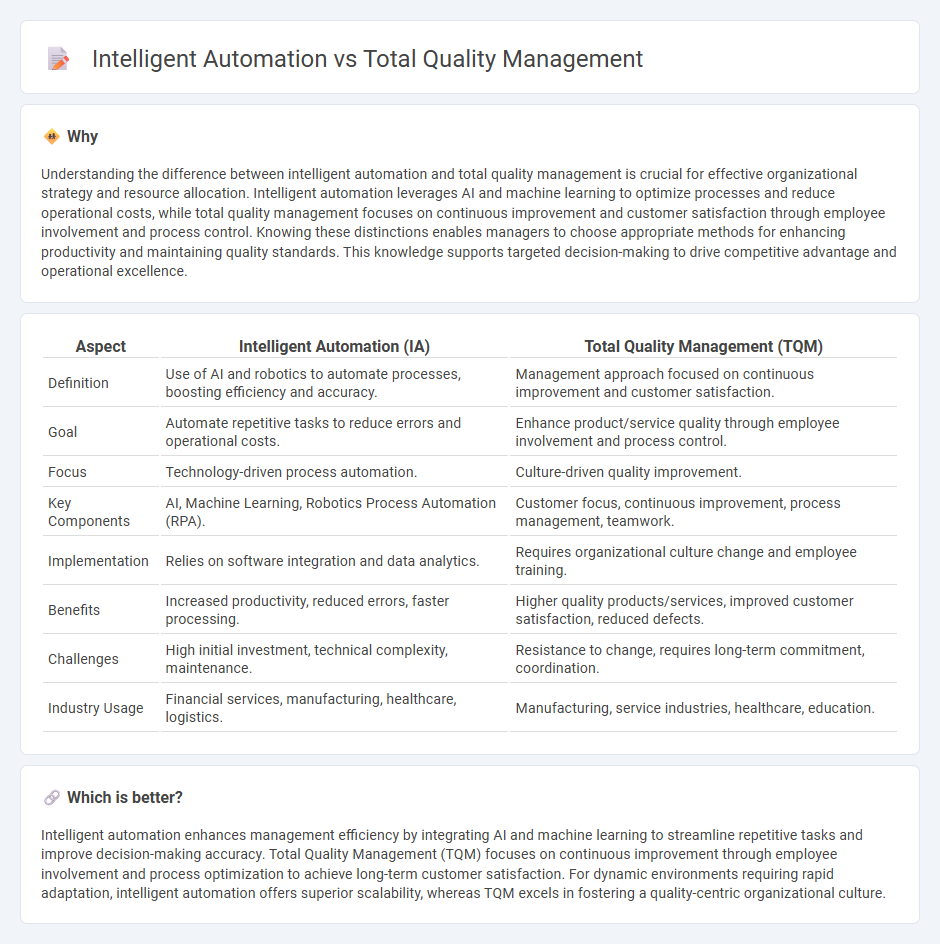
Intelligent automation leverages artificial intelligence and machine learning to streamline business processes, enhance efficiency, and reduce errors through dynamic decision-making capabilities. Total Quality Management (TQM) focuses on continuous improvement, customer satisfaction, and employee involvement to maintain consistent product and service quality. Explore how integrating intelligent automation with TQM strategies can transform your management practices.
Why it is important
Understanding the difference between intelligent automation and total quality management is crucial for effective organizational strategy and resource allocation. Intelligent automation leverages AI and machine learning to optimize processes and reduce operational costs, while total quality management focuses on continuous improvement and customer satisfaction through employee involvement and process control. Knowing these distinctions enables managers to choose appropriate methods for enhancing productivity and maintaining quality standards. This knowledge supports targeted decision-making to drive competitive advantage and operational excellence.
Comparison Table
| Aspect | Intelligent Automation (IA) | Total Quality Management (TQM) |
|---|---|---|
| Definition | Use of AI and robotics to automate processes, boosting efficiency and accuracy. | Management approach focused on continuous improvement and customer satisfaction. |
| Goal | Automate repetitive tasks to reduce errors and operational costs. | Enhance product/service quality through employee involvement and process control. |
| Focus | Technology-driven process automation. | Culture-driven quality improvement. |
| Key Components | AI, Machine Learning, Robotics Process Automation (RPA). | Customer focus, continuous improvement, process management, teamwork. |
| Implementation | Relies on software integration and data analytics. | Requires organizational culture change and employee training. |
| Benefits | Increased productivity, reduced errors, faster processing. | Higher quality products/services, improved customer satisfaction, reduced defects. |
| Challenges | High initial investment, technical complexity, maintenance. | Resistance to change, requires long-term commitment, coordination. |
| Industry Usage | Financial services, manufacturing, healthcare, logistics. | Manufacturing, service industries, healthcare, education. |
Which is better?
Intelligent automation enhances management efficiency by integrating AI and machine learning to streamline repetitive tasks and improve decision-making accuracy. Total Quality Management (TQM) focuses on continuous improvement through employee involvement and process optimization to achieve long-term customer satisfaction. For dynamic environments requiring rapid adaptation, intelligent automation offers superior scalability, whereas TQM excels in fostering a quality-centric organizational culture.
Connection
Intelligent automation enhances Total Quality Management (TQM) by streamlining processes and reducing human errors, leading to consistent product and service quality. Automation tools collect real-time data, enabling continuous monitoring and improvement aligned with TQM principles. Integrating intelligent automation into TQM frameworks drives operational efficiency and customer satisfaction through precise quality control.
Key Terms
**Total Quality Management:**
Total Quality Management (TQM) emphasizes continuous improvement, customer satisfaction, and employee involvement to enhance organizational processes and products. It integrates quality principles into every level of management, ensuring a culture of consistent quality and long-term success. Explore how TQM drives excellence and surpasses traditional automation by visiting our in-depth resources.
Continuous Improvement
Total Quality Management (TQM) emphasizes continuous improvement through systematic process evaluation, employee involvement, and quality control to enhance customer satisfaction. Intelligent automation integrates AI-driven tools and machine learning algorithms to optimize workflows, reduce errors, and accelerate improvement cycles in real-time operations. Explore how combining TQM principles with intelligent automation drives superior continuous improvement outcomes.
Customer Focus
Total Quality Management (TQM) emphasizes continuous improvement and customer satisfaction through employee involvement and process optimization, aiming to consistently meet customer expectations. Intelligent Automation leverages AI and machine learning to enhance customer focus by providing faster, personalized, and error-free service experiences. Explore how integrating TQM principles with intelligent automation can revolutionize your customer engagement strategy.
Source and External Links
Total Quality Management (TQM): What Is It, Principles and ... - Total Quality Management (TQM) is a strategic approach that focuses on delivering high-quality products and services to maximize customer satisfaction.
Mastering the 8 Principles of TQM (Total Quality ... - TQM's core principles include client-centricity, leadership, inclusion, procedure awareness, and ceaseless refinement to optimize consistency and ensure long-term viability.
Introduction and Implementation of Total Quality ... - Total Quality Management (TQM) integrates all organizational functions to focus on continuous improvement and customer satisfaction through employee involvement and strategic planning.
 dowidth.com
dowidth.com